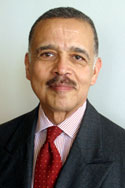ARCHIVES
OF EDITORIALS
July 28, 2005
Requiescat in pace
There are some who serve the cause of black equality
without reservation and with no publicity or public acclaim. Such
a man was Samuel Perry who died on June 14th at the age of 82
with as little notice as he had lived.
Sam was a very private man who might be considered by some to
be eccentric. He always wore a coat and tie in public, and his
greetings to those who were not friends were always anachronistically
formal. He never owned a car and walked everywhere unless obliging
friends would give him a lift.
At a time when the nation is veering recklessly toward illiteracy,
he was committed to high culture. For the past 45 years or more
he was totally devoted to the mission of awakening black students
to the life of the mind and preparing them to be admitted to the
best colleges and universities.
Throughout his life, Sam Perry was driven by the desire to attain
academic excellence. This was an idea implanted in him by his
parents. His father was an AME minister and his mother had attended
the New England Conservatory. As a student at Boston Latin School,
Sam was fastidious about his studies and became an excellent debater.
Upon graduation from Latin School, Sam entered Harvard in the
fall of 1941. As was the case with many young men at that time,
his studies were interrupted by World War II, and he was drafted
into the army. A friend who served with him in the army suggested
that the rank racial segregation had a damaging effect on Perry’s
psyche. He was accustomed to Boston’s genteel discrimination,
but he found the more blatant version intolerable.
After the war he finished Harvard and went to work for a short
time in the textile industry. However, his military experience
had generated in him a strong desire to work for racial progress.
He became a reporter for The Boston Chronicle, a black newspaper
then in publication, and he became accredited as a United Nations
correspondent.
There was a point at which Sam perceived that his prospects for
success in the white dominated world were fair to negligible.
He then decided to foreswear personal achievement and mobilize
the next generation for academic success. Such an epiphany was
not an uncommon occurrence among the older generations of black
men.
The decision to become a tutor was the right one for Sam, who
was by nature a scholar. In 1980 he wrote in the class report
for the 1945 class, “the incessant challenge of mental stimulus
is vital to my life.” He taught math, English, history,
Latin and French. He would also personally research other subjects
to assist any of his students.
Even more important than the subjects he taught was the self-affirmation
with which he imbued his students and their parents. He made those
students who showed promise aware that they could achieve academic
success if they were willing to do the work.
The most unusual aspect of Sam’s academy is that his classroom
was Bates Hall in the Boston Public Library in Copley Square.
Parents would deliver their often protesting children to Sam after
school or on Saturday morning. Students of various ages would
be sitting at tables in the library completing the assignments
Sam had prepared for them.
Sam tutored over 3,000 students, most of whom went on to graduate
from major colleges and to enjoy successful careers in the professions
and business. Sam had the respect of his students and those in
the community who understood the nature of his service.
As is common with scholars, Sam preferred the company of books.
Scholarly research was his form of entertainment. Other than afternoons
during the week and Saturdays with his students he lived a solitary
life. Yet his presence in Roxbury was a beacon urging those who
were aware to attain academic excellence. He will be missed.
Home
Page

